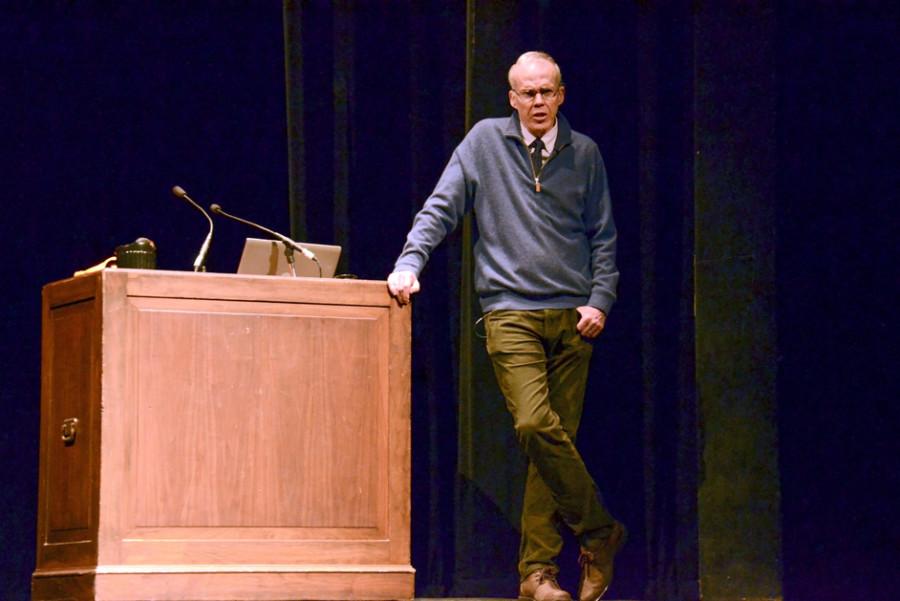Bill McKibben discusses climate change, emphasizes importance of environmental movements
Annabel Edwards/Daily Senior Staffer
Bill McKibben, renowned environmentalist, discusses climate change at SEED’s winter speaker event. McKibben, founder of the environmental movement 350.org, has protested the Keystone XL pipeline and has written bestselling books about the environment.
March 4, 2015
Activist Bill McKibben spoke at Northwestern on Tuesday about climate change, calling on students and Evanston residents to join the global environmental movement.
Attendees filled the lower level of Cahn Auditorium to see McKibben, who came to NU as Students for Ecological and Environmental Development’s winter speaker.
McKibben, bestselling author and winner of the 2013 Gandhi Peace Award, is the founder and organizer of 350.org, an international environmental organization that publicizes the increasing levels of carbon dioxide in order to encourage people worldwide to pressure their leaders to address climate change.
During the event, McKibben discussed the importance of taking action against climate change and placed emphasis on the activities that members of 350.org have carried out around the world.
McKibben said that 25 years ago, scientists didn’t imagine that environmental changes happening around the world right now would come so early. He said climate change is the biggest thing human beings have done in history.
When describing his work as an environmentalist, McKibben said that although he is a writer and not a scientist, he feels the need to let the world know of the environmental changes happening across the globe to avoid more damage.
“At a certain point some years ago, it began to dawn on me that another book is not going to move the needle on this question,” McKibben said. “It really began to become clear to me that this is no longer an argument over data and science. We won that argument, we won it 20 years ago.”
To McKibben, the fight against global warming is no longer about researching and getting more data, but using the information to combat it.
“This argument, like most important arguments, depends on power, not on data,” he said. “You have to win the argument but then you have to win the fight, and that’s what we haven’t done any of.”
He said many battles are lost because the fossil fuel industry is too economically powerful, but argued that by convincing the world’s population to break up from these industries, change can be made.
350.org, which began as a small group of Middlebury College students, has now held demonstrations in over 180 countries, he said.
McKibben and 350.org have protested the Keystone XL pipeline, which President Barack Obama vetoed last week. In 2011 and 2012, his campaigning against the pipeline led him to spend three days in jail.
During his speech, McKibben celebrated the work of student movement DivestNU, which is calling on the University to divest from the coal industry, and said young students are usually the leaders of big environmental campaigns, and therefore it is time for older generations to join the fight.
“(Young people) have been the main leaders of this movement … but when it comes to the time to go to jail, it’s possible that if you’re 21, an arrest record is maybe not the really best thing for your resume,” he said. “One of the few unmixed blessings of growing older is that after a certain point, what the hell are they going to do to you?”
Scott Brown, a leader in DivestNU and former Daily staffer, said he was struck by McKibben’s humility and support for the environmental movement.
“He’s leading this global movement and talking to thousands of people and yet he took the time to shake each of our hands,” the Medill sophomore told The Daily. “I think that’s the power of this movement. We’re all tiny, little parts of a giant thing but the fact that we all care so much about what’s going to happen everywhere is really, really important.”
Madeline Miller, Weinberg senior and co-president of SEED, said the group chose to invite McKibben due to his expertise on the topic of divestment from fossil fuels, something she considers one of the most pressing environmental issues she wants NU and Chicago to know about.
“We were talking about … a place where people won’t be as affected by climate change,” she told The Daily. “He said there’s no location that you can go to but you will find strength in community and that communities are the most important thing for helping people fight against the struggles that will be brought by climate change.”
Email: marianaalfaro2018@u.northwestern.edu
Twitter: @marianaa_alfaro



